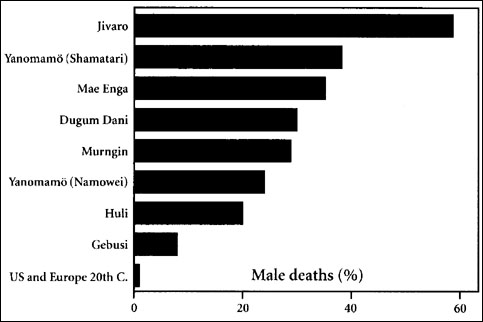"Forced to choose between limiting population or trying to increase food production, we chose the latter and ended up with starvation, warfare, and tyranny."
So is it right to conclude that just because we couldn't control our reproductive instincts that agriculture is to blame for that? Agriculture arguably permitted less warfare, because by being able to feed more people, there was less of a reason to go to war. Steven Pinker covers the subject of violence in his TED talk, A brief History of Violence. His argument is that the hunter gatherer mode of existence was equally if not more prone to violence due to the much larger land space required to support a small tribe, so when there was any kind of population pressure or if there was a need to migrate due to change in environment, there was a reason to go to war with neighboring tribes.
Here's an interesting and relevant clip:
General Miles Blows off American Indian Myths
Now, that clip is from a movie, so I'm taking it with a grain of salt, but it is a compelling and intuitive point of view.
Here is the graph Steven Pinker uses in his TED talk on warefare among hunter gathers:

Now, this is suddenly a dramatically flattering view of agriculture. Pinker and Diamond are amazingly opposed ideologically, so one of them is being very dishonest or deluded.
Now, I acknowledge that the graph just links to a standalone image - no website with text to explain the graph. As for the graph itself, it's a bit suspicious and I will go onto the official TED site to see if I can find any citations that support Pinker's graph. Also to note, is that there are thousands of tribes in the world, but it shows eight specific (and perhaps obscure) tribes. It doesn't show overall averages across tribal societies in general, so there's no indication that these eight tribes are representative of tribal societies in general. So these examples could be cherrypicked.
Diamond refers more than a couple times to the Kalahari bushmen, who he seems to see as a model for sustainable living. I wonder how often the Kalahari go to war? Why don't their populations start to spill out into other areas causing conflict? These are questions I plan on researching over the next month or to, I just thought some of you may find this interesting, or perhaps you have an insight into these issues you might share.